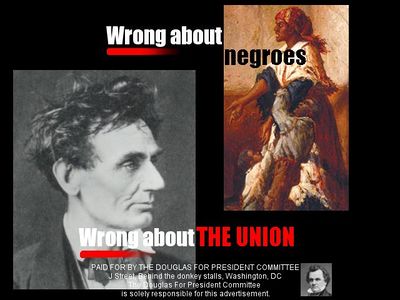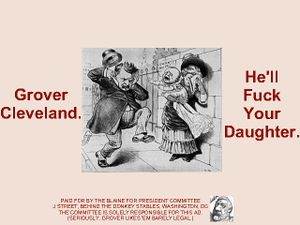Political advertising

Political advertising involves the use of advertising by politicians to bring their messages to the masses. These usually warn voters that the gates of Hell will open and demons will eat skin off their still-living victims if voters approve a bond issue for school playgrounds.
Promoting candidates with paraphernalia -- whether ribbons, flowers or condoms -- goes back to the Middle Ages. Peter de la Mare, the first speaker of the House of Commons, painted anti-monarchical slogans on the back of a sheep to win major democratic concessions from Richard II in 1377. Today, political advertising is a multibillion dollar industry, employing musicians who play ominous chords, photographers who take unflattering pictures and video artists who can make your saintly grandmother look like a meth-smoking, child-murdering Klan wizard.
In theory, political advertising could explain policy, inform citizens and connect people to their leaders. But theoretically, Bill Moyers could record a version of "Hips Don't Lie."
Famous political campaigns
1828: The common man wins the vote, and promptly pisses on it

Before 1828, presidential candidates were selected in backroom caucuses of politicians, business leaders and elites, who selected election candidates that would protect their interests. This horribly undemocratic practice, which put a disproportionate number of wealthy white men in the White House, has now faded into history. White male suffrage came to the United States by 1828, and the common man had a common champion: Andrew Jackson. His opponent, incumbent John Quincy Adams, felt it was beneath his dignity to step out and be seen, but his partisans quickly hit the stump, engaging in mud-slinging and suggesting that Jackson's wife Rachel was an adulteress. The anonymous author of Letters of a Trew Republican wrote:
- Good sons of Brother Jonathan, pause and meditate upon the domestic situation of this Coriolanus now brought before us in the Forum, wrapped in the porphyry and trusting the plebes to thrust the fasces upon him and take command of the Res Publica -- for I tell you, that sufficient logitation upon the query would stir one's deepest love of continence at the vivacious creature by his side. Surely, good Vermonters, you may send this Catiline to Salt River when the rays of the sun pierce your very cockles, and when you are confronted with visions of a capitol that would rival the debauches of Theodora in profilgacy and dissoluteness; surely you see the results of placing this headstrong creature in our government, where she shall lead her wine-soaked minions through our Congress. The commonality of mankind will gasp and blush at the desecration of manly virtue and decency, and they will say the United States has recreated the reprobate atmosphere of the late Julians; yea, they will declare, Nero and Sporus have reunited where WASHINGTON once held sway.
Jackson's infuriated supporters struck back in a series of pamphlets that used the language of the common man:
- Did you know the president's wife is a limey? It's true. Every goddamned word of it. I swear to Christ, can you believe this cocksucker? The king of England must have all our motherfucking secrets. Son of a bitch. Do you want to stop this bullshit? Fuck yes, you do. So, men of Tennessee, cast your vote for the Hero of New Orleans, or I will put a porcupine up my ass. You know what happens if you allow the "corrupt bargain" to stay strong? England gets all the plans for our forts, and George IV laughs so hard, he dickwhips us. And Adams? He'll love it. In fact, he'll change the laws so he can marry him. You don't want gay marriage, do you?
1884: Democratic candidate accused of heterosexual relationship
The 1828 campaign provided a model for every subsequent run for office. However, 50 years of stump speeches devoted entirely to dickwhippings drained the phrase of its potency. In 1884, the political advertisement took its next great leap forward.
Democratic presidential nominee Grover Cleveland admitted that summer to fathering a child out of wedlock. His Republican opponent, James G. Blaine, immediately took to the airwaves, launching dozens of spots hammering Cleveland over the issue. In one famous ad, one hundred Cleveland look-alikes passed through the revolving doors of a brothel, while grinning suggestively at a number of maidens walking by. An announcer ended the ad with "Now Grover Cleveland wants to do to America what he did to Maria Halpin. America can't take that risk."
Blaine avoided direct mention the controversy in his advertisements, but made many allusions to Cleveland's sexual life. The Secretary of State made a television spot where he stood before a fireplace in a comfortable sweater, smiling before the camera as his wife stood nearby. He said:
- You know, there's been an awful lot of talk lately about self-control. Well, I'm here to tell you that no one has ever accused James G. Blaine of indecency or immorality. I share your values -- the values that make this country great. And if you give me the honor of serving as your president, I will uphold that sacred trust -- publicly and privately. I'm James G. Blaine, and I approved this message because I will never sleep with a woman.
Voters narrowly elected Cleveland in November, deciding that Cleveland's sexual activities were slightly less repulsive than Blaine's gleeful acceptance of bribes from railroads.
Methods

A good political advertisement avoids the truth, but is equally careful not to skid into an outright lie. Let's take a hypothetical example, a race between Candidate A and Candidate B. Candidate B, who receives huge donations from the insurance industry, goes on the radio with this ad:
- Last night Candidate A collapsed at a party. They took him to a hospital and pumped a gallon of semen out of his stomach I swear to god it's true. I'm Candidate B and I approved this message.
Problematic, because Candidate A was actually interviewed at a school play that evening, and Candidate B stole this narrative from a popular urban legend. What Candidate B should do is make statements about Candidate A that have their toe in a pool of truth and the rest of their body in a pile of cow dung. Like this one:
- When a local newspaper asked Candidate A about his necrophilia[1], he REFUSED to answer.[2] Is this the kind of liberal[3] representation we want in Congress?[4] Call Candidate A today and ask him to tell the truth about his relationship with dead people. I'm Candidate B and I approved this message, because I don't have sex with the deceased.[5]
A good attack ad selectively quotes newspaper articles. By pulling hostile quotes from a variety of stories, one can turn Mother Theresa into Joseph Goebbels. Take this radio spot.
- Candidate A. The New York Times says, 'possibly stoned.' The Washington Post says, 'mooned a group of schoolchildren.' And USA Today says 'murdered thousands of Kurds during his brutal rule in Iraq.' I'm Candidate B and I approved this message.
Notice that while the quotes have nothing to do with Candidate A, the ad does not actually state that the quotes relate to him. But the listener is immediately convinced that Candidate A is an acid-dropping dictatorial pervert.
This serves a double purpose: It discredits the opponent and the media, so voters turn the page when news breaks that Congressman B is taking tax dollars to cover his house in gold. With slaves. Because he's repealed the 13th Amendment. And everyone must now devote three days a week to working on their congressman's estate. Report to mandatory gold-covering duty by 0800.
Buzz words

Television advertisements use simple and direct words to get their points across. Every political television spot contains combinations of one or more of these words, displayed in 72-point type:
- Liberal
- Son
- Taxes
- Jobs
- heterosexual
- Wrong
- My
- Change
GayValues- Dog
- Crony
- Douchebag
Hence, "Candidate A, you and your liberal cronies are wrong to use our tax dollars to change the values of my heterosexual dog." And "My son will create heterosexual jobs and change douchebags."
The future
Political advertising will continue until voters realize that the public business is too complex to squeeze into a 30-second spot on television, fully read up on policies and cast their ballots after a careful period of reflection on what their choice will mean, both today and tomorrow.
Therefore, political advertising will continue indefinitely.
References
- ↑ The question asked was, 'Is Candidate B calling you a necrophiliac because he's down 30 points in the polls?'
- ↑ He said 'I think he's trying to distract people from his polygamous marriage to three 12-year-olds.'
- ↑ Candidate A is pro-life, pro-gun and pro-death penalty but is not opposed to contraception.
- ↑ This year promises a clean sweep for lunatics.
- ↑ Did hump a comatose man once.

